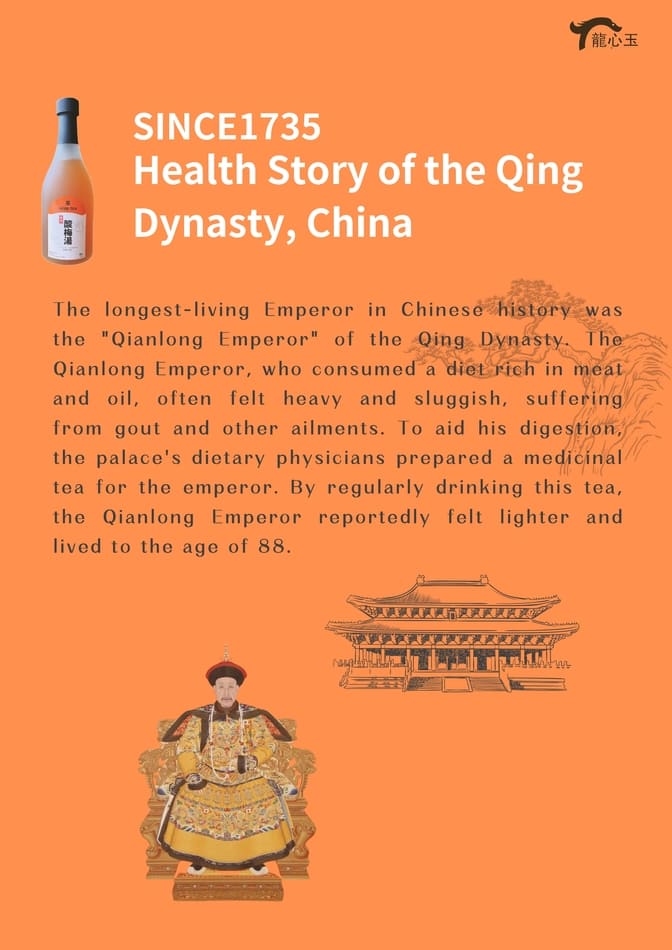
・明朝・
朱元璋皇帝
The practice of drinking plum juice dates back to the Western Zhou period. Since then, plums have been increasingly used in our daily lives.
The form of “Sunmei Tang” (sour plum soup) began during the Ming Dynasty, when Emperor Zhu Yuanzhang, who contracted a contagious disease similar to what we now call COVID-19, felt weak, heavy-headed, and dizzy. While in the kitchen, he happened to smell the fragrance of dried black plums (wumei), which made his head feel lighter.
Emperor Zhu Yuanzhang, who enjoyed spending time in the kitchen, decided to make a medicinal drink by brewing wumei himself. After drinking this herbal tea for five days, he recovered from the disease.
“It’s good for summer fatigue and summer colds.”
・清朝・
乾隆皇帝
When the Qing Dynasty began, the Manchu people from what is now northeastern China unified the Ming Dynasty and established the Qing Dynasty. During this time, the emperor who lived the longest in history emerged. His name was the Qianlong Emperor.
The Qianlong Emperor lived to the age of 88, making him the longest-living emperor in history. To this day, many people are fascinated by the Qianlong Emperor’s health methods. The location was near Tiananmen in present-day Beijing, and the Qianlong Emperor valued his health, showing a keen interest in prevention and possessing extensive knowledge of health preservation. He was skilled in both martial and literary arts, regularly exercised, and even enjoyed hunting.
At the time, the emperor’s meals were rich in oil and centered around meat, which often made him feel sluggish. He also had a tendency to gain weight and consumed delicacies that weren’t always healthy. However, concerned for the emperor’s health, the palace’s dietary physicians (the modern equivalent of nutritionists) began creating healthy drinks for him to consume daily.
As a result, the emperor remained slim, with fewer illnesses, and became the longest-living emperor in history. It is believed that this medicinal drink played a role in his long life.
“It’s good for digesting meat and oil.”
・近代・
民衆へと広がる
Thanks to the Qianlong Emperor, sour plum soup (Sunmei Tang) can be found in every neighborhood of Beijing. Chinese tea culture is very ancient, and rather than green or black tea, it began with the emperor’s preference for health-oriented herbal teas that everyone came to enjoy. Sour plum soup continues to play an important role in health prevention for many people to this day.
・現代・
満漢全席
Are you familiar with “Manhan Quanxi”? It is the world’s most extravagant banquet, featuring 108 different dishes. If you’re going to eat, China is the place, right? However, Chinese cuisine, with its abundance of meat and oil, is vast and varied, and if you don’t eat thoughtfully, it’s only a matter of time before it harms your health. That’s why life in China without cleansing teas for the body is unthinkable, as these teas help prevent a variety of diseases. Sour plum soup (Suanmei Tang), in particular, is a great complement to the modern, Westernized eating culture, which often involves excessive meat, oil, and overeating.
ShizukuAR – Specializing in Traditional Chinese Herbs
View on Google Maps
Address:
1F, Sanki Fuji Building, 4-1-1 Ikebukuro Honcho, Toshima-ku, Tokyo 170-0011, Japan
Phone Number:
+81-3-6907-0083
